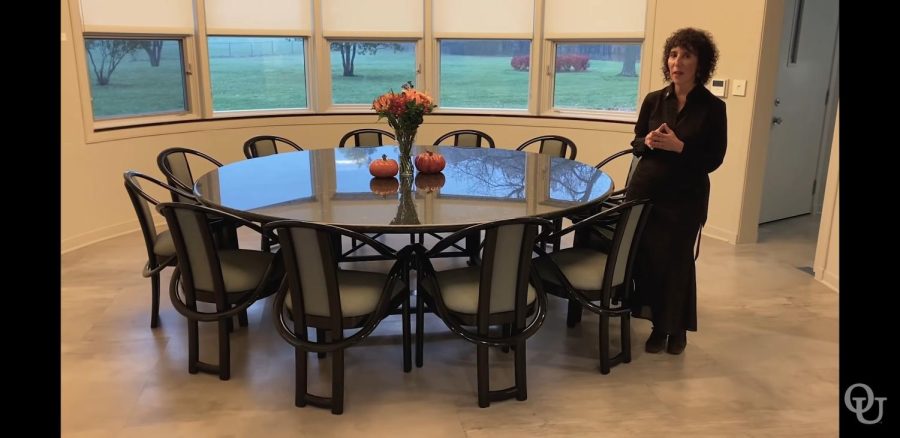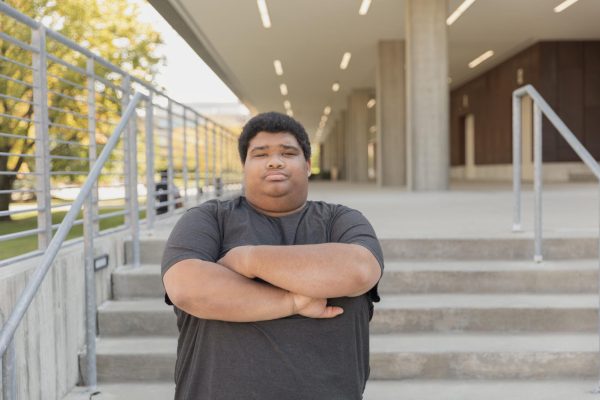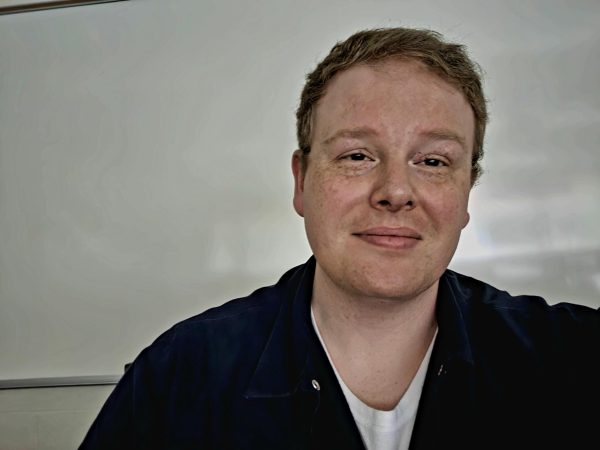Letter to the editor: About that Dining Table
Photo courtesy of Oakland University
A screen cap of President Ora Hirsch Pescovitz’s Nov. 19 OU update video.
About that Dining Table
By Andrea Knutson and Chaturi Edrisinha with special contributions from Jeremy Johnson, Speaker of the Legislature for OUSC and a staff member who prefers to remain anonymous.
Dear President Pescovitz,
We’d like to ask you about your dining table, which was featured in your recent Thanksgiving message of November 19th, 2021. At minute 1:55 you describe why it is a beloved feature of your home. You point out that while there are only twelve chairs around it, it could actually seat eighteen. You value it not only because it seats so many but also because it’s round. Its roundness is symbolic for you because it implies an “equality” among guests.
Even though this video was sent to the entire campus community, we cannot figure out who the audience for this video was, and we’d like to explain why your Thanksgiving message has been lost on many of us who received it and left us with a profound sense of dismay. In the video you recognize how hard the pandemic has been for us and ask us to meditate on “why we are grateful for what we have in our lives.” This is a moment that, unfortunately, draws a great deal of attention to your wealth and comfort (primarily because your art collection is prominently featured) — and thereby draws into relief what the rest of us don’t have but have to continue to fight for because your administration continues to diminish our dignity, livelihood, health, security, and voice in shared governance. We’ve gotten sick with COVID (while your administration worked to gut our health benefits); student debt has skyrocketed (while your administration increased tuition); our lived experiences are a source of strength that offer solutions and guidance (while your administration turns a deaf ear and erects hurdles). Our campus community is struggling with lost jobs, lost wages, lost homes, childcare, and mental health.
And you are our university’s president. We’d like for you to take a moment to imagine what it would be like for you to pull a chair out at your dining table for your students, your faculty, and your staff. We ask that you think about equity instead of an imagined equality or fantasy that erases our lived experiences.
If you were to pull a chair out for your students you would
Invest in programs that would reduce costs such as the Affordable Course Materials Initiative and inclusive access. Faculty have, in fact, come up with solutions for the issues that students are facing with regard to courses, but they are dismissed or completely ignored.
Increase workplace democracy. There are a lot of coercive practices and people in various workplaces on campus, and student workers should be free to fully express their concerns and receive fair and equitable wages for work performed.
Invest in equity programs. There is a massive gap in graduation rates between white and non-white students, and this is unacceptable.
Make Election Day a university holiday. It’s a simple problem with a simple solution that OU’s Student Congress has been advocating for for more than a year and a half now.
Make a commitment to giving students a say in decisions about our university.
If you were to pull a chair out for your faculty you would understand that
Your faculty embraced virtual teaching within a week of notification, juggled children, aging parents, significant others, their own healthcare needs, the emotional and educational needs of their students, and delivered on OU’s promise, “Seguir virtute e canoscenza,” seek virtue and knowledge.
We continue to make sacrifices during the on-going pandemic.
The tuition benefit to our children at a zero cost design to Oakland was important to your faculty, and when your administration attempted to remove it during the recent faculty contract negotiations it was offensive to all of us.
While cutting our faculty retirement benefits, you enjoy 17% in retirement, an amount more than the entire yearly salary of an average faculty member. This is inequitable and demonstrates that you are not investing in our welfare and do not value our work.
The nominal 2% retirement contribution for our special lecturers meant more than the average $200 it would have cost OU. It would have acknowledged their contributions and OU’s recognition for their work and commitment to their welfare in retirement and old age. Instead, they will now retire from OU with $0 in retirement benefits.
Not giving your faculty a decent cost of living adjustment for the work they perform is a promise broken by your administration.
The current “merit pay” that your administration has implemented is a threat to faculty morale, collegiality, and job security. It’s a misnomer as it is not tied to “meritorious work” but to a universal percentage devoid of value and reference.
The faculty were confused during contract negotiations, when your administration refused to update the faculty contract with gender neutral pronouns while concurrently professing diversity, equity, and inclusion.
We’re disappointed that you didn’t use the opportunity of the Thanksgiving message to use OU’s new Land Acknowledgment to recognize the original and contemporary stewards of the land OU occupies, the Three Fires Confederacy.
The bonds of fellowship, goodwill, and shared vision have been severely fractured and that your faculty are still traumatized by the recent contract negotiations.
We hope going forward, you
Celebrate the value and meaning of shared governance by implementing transparency and ending the secrecy and mystery that have marked decision-making by your administration.
Recognize that our commitment to our students reaches far beyond this campus. It spans distances and decades and generations and binds us together. It transcends symbolic tables.
Perhaps, then, you would invest in your faculty who are the lifeblood of this university.
If you were to pull a chair out for your staff you would
Be transparent in communication with all your staff, not just directors and faculty. The telephone game is unofficial OU policy, and it does a disservice to everyone. Some staff never receive the information they need or worse: they get a version of facts that best suits the interests of whoever is sharing the news.
Understand that the use of unofficial policies by HR breeds inequity. Unwritten and unofficial policies are difficult to challenge or fairly deploy, and yet these policies are used to govern staff behavior. An example of such a practice was the “unofficial” no CT remote work policy that took several years and multiple strategies to overturn. When a policy isn’t codified, its borders become porous and subject to the whims of supervisors.
Stop telling us you’re open to directly hearing our concerns when you’ve hired a chief of staff to guard the gate and keep us out. None of us realistically expect to be able to “come talk” to you when we have a problem, and you ensured as much with your staffing choices.
Hear us say that we’d like you to stop adding members to the executive class of OU employees. Maybe then you could afford raises for staff who worked just as hard as APs and faculty during the pandemic — in many cases harder because we were expected to be physically present on campus but received no raise. Not giving us a raise when we’re facing the same cost of living and inflation expenses as the rest of your employees is a choice, one that telegraphs a lack of regard for our work, our talent, and our commitment to OU and its students.
Answer one very specific question. The bulk of “staff” jobs at OU are CT, or Clerical Technical positions. We’d like to know what you think a “CT” does. The university seems to have a very dated idea of who CT’s are as a group and what we do. The average supervisor would tell you a CT is a secretary, but the classification holds all kinds of positions from instrument makers to archivists to data technicians. The classification also includes office administrators who are not, for the record, secretaries. That’s an entirely different job description.
As the leader of our university, we’d like you to listen to your students, faculty, and staff and help to build a campus community around equity, fairness, and inclusivity. We ask you to model and uphold the values behind the slogan “Grizzlies Protect Grizzlies.”
We have once again pulled a chair out for you. We invite you to listen, understand, and act. This Thanksgiving, we give thanks for leaders who understand what their community needs.
Letters to the editor can be submitted to [email protected].







Jeremy Johnson • Nov 30, 2021 at 11:49 AM
Consider signing and sharing this petition that demands OU invest more in the community and less in telling us to “be thankful”
http://www.change.org/OUTrashTheTextbooks
Kristen Klein • Nov 25, 2021 at 4:53 PM
Thank You! Thank you! Thank you!!! Professor Knutson and Professor Edrisinha!!!!! What kind of Thanksgiving message was that?? Who is advising the Ora and telling her it’s Ok to poor shame our OU community!!! Tone deaf and out of touch with the rest of the 99% Ora even acknowledged how this year has been “challenging” for everyone and why we should be “grateful” and the “wonderful things we have!!!” Are you serious???? You showed us all your wonderful things…do you think we have paintings worth $100,0000??? hanging around in our apartments??? “sacrifices so many of you had to make???” But I guess not you Ora!!!! We look forward to a future without you and all these jokers!!! If you really wanted to make a difference, you wouldn’t have increased our tuition during a pandemic and reduced the health benefits for our professors and staff during a pandemic and not done a dumb video showing us what a luxurious and free house you are living at. What’s wrong with you????”
Anon2 • Nov 26, 2021 at 7:53 PM
Ditto
Jenna Warman • Nov 27, 2021 at 11:52 AM
Yes! Well said. Thank you professors. I pray they don’t try to fire you two for speaking the truth. Thank you for talking about the tuition hike.
Jackie Alumni • Nov 25, 2021 at 2:40 PM
OMG!! Hey Ora how about include healthcare for your graduate students during a pandemic!!!! How about paying your special lectures??? Your administration didn’t want to give them 2% in retirement but you get to live free in luxurious house????? Why not take 16% instead of 17% in retirement and pay the special lectures?? I am sure your 1% would cover the 2% for all the special lectures at OU
Kelly Fritz 2021 soon to be Alum • Nov 25, 2021 at 2:25 PM
Thank You! Thank you! Thank you!!! Professor Knutson and Professor Edrisinha!!!!! What kind of Thanksgiving message was that?? Who is advising the Ora and telling her it’s Ok to poor shame our OU community!!! Tone deaf and out of touch with the rest of the 99% Ora even acknowledged how this year has been “challenging” for everyone and why we should be “grateful” and the “wonderful things we have!!!” Are you serious???? You showed us all your wonderful things…do you think we have paintings worth $100,0000??? hanging around in our apartments??? “sacrifices so many of you had to make???” But I guess not you Ora!!!! We look forward to a future without you and all these jokers!!! If you really wanted to make a difference, you wouldn’t have increased our tuition during a pandemic and reduced the health benefits for our professors and staff during a pandemic and not done a dumb video showing us what a luxurious and free house you are living at. What’s wrong with you????
Robert Anderson • Nov 25, 2021 at 8:20 AM
Nothing says equality like empty invitations to sit at the table. Thank you for the excellent letter.
Mary Lyons • Nov 24, 2021 at 11:08 PM
Thank you Professor Knutson and Edrisinha. I watched the video that the president sent out poor shaming us and talking about all of her artwork and using words like “you people” and was just sick to my stomach. Thank you for pointing out how the rest of us feel. I agree with the other commenter. Ora is just tone deaf. Who thought it was a good idea to send us a video showing how privileged and wealthy the president was when the rest of us can barely afford to buy a Turkey this year or spend time with our families. My sister just got Covid and has lost her sense of taste so that’s that for our thanksgiving meal. I just hope OU wakes up and starts thinking about us students more.
Anon • Nov 25, 2021 at 11:47 AM
Oh, seriously, this self-proclaimed “elite” made of narcissists like Pescovitz and intellectual zeros like Rios-Ellis and Cunningham is already too “woke” to wake up. For these equity advocates we are Untermenschen. I will never forget Pescovitz’s appalling smirk as she was yapping away about “financially responsible” decisions during the State of the University presentation.
Anonymous • Nov 24, 2021 at 10:53 PM
“Let them eat cake. -Ora Antoinette
Jocelyn • Nov 24, 2021 at 8:54 PM
Well said. Alumni need to be clear that if you want our support, OU leadership is going to have to do better. This status quo is unacceptable.
Nigel • Nov 24, 2021 at 5:08 PM
Bravo Professors. You speak for all of us. Thank you for including all our voices in your response to the disjointed and tone deaf video put out by the president.